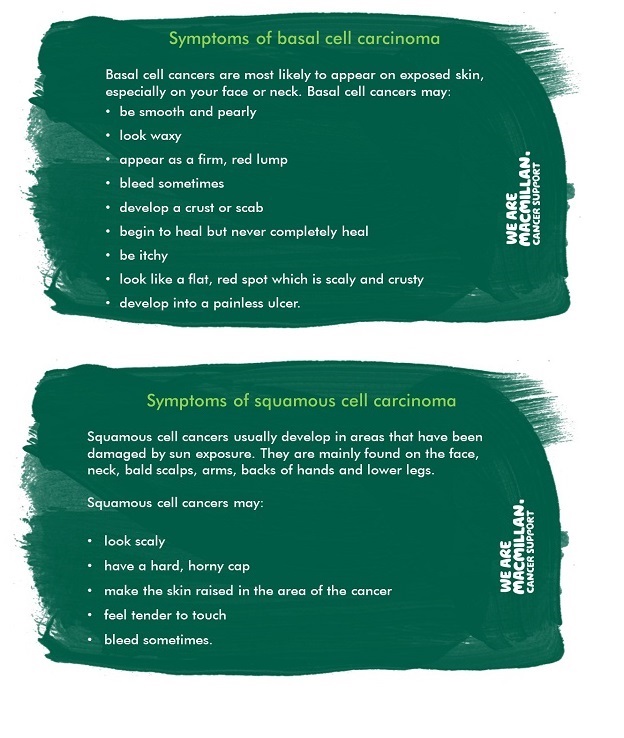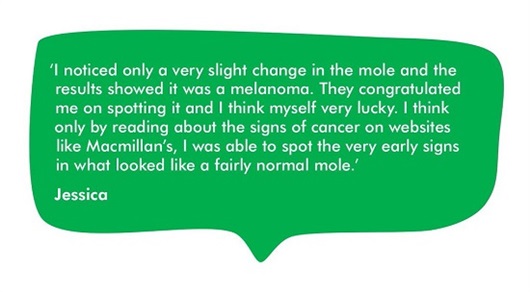The weather is warming up and early May bank holiday is here. Today’s blog, written by Editorial Assistant Eilis, is about spotting skin cancer symptoms to increase the chance of early detection. It also talks about what happens if you are diagnosed.
What do my mum, actor Hugh Jackman, and two members of the Kardashian clan have in common? Well, it’s certainly not millions in the bank and a ginormous social media following – that’s for sure. They have all, however, had skin cancer.
There are three main types of skin cancer. The two most common types of skin cancer are basal cell carcinoma (BCC), and squamous cell carcinoma (SCC) which are known as non-melanoma skin cancer. The third main type is malignant melanoma, which is less common. There are other rarer types of skin cancer which affect less than 1% of the population.
We often hear advice about what to look out for in terms of skin cancer: unusual moles or marks on the skin which have changed in shape… But what does ‘unusual’ mean? What should we really be looking for?

Melanomas can start with a change to normal skin. This may look like a dark area, or an abnormal mole. Other melanomas develop in a mole or freckle that you already have. It can be difficult to tell the difference between a melanoma and a normal-looking mole. It’s a good idea to check your skin regularly and speak to your doctor if you notice any changes.
This ABCDE list helps you remember what to look for:
A = Asymmetry
B = Borders
C = Colour
D = Diameter
E = Evolving
If you notice any of these signs, or if you have any new marks on your skin, or a mole that tingles or bleeds, it’s always best to have it checked by your GP as soon as possible. The earlier cancer is found, the more likely it is to be successfully treated. Although, there are many other conditions that appear in the skin that are not cancer, especially in older people. These should still be checked by your GP.

How is skin cancer diagnosed?
1st stop - Your GP
If you have symptoms, it’s best to see your GP. If they think your symptoms could be caused by cancer, they will refer you to a hospital for specialist advice.
2nd stop - Referrals
Most people with suspected skin cancer are referred to a specialist at their local hospital. A doctor who specialises in treating skin diseases is called a dermatologist.
If your GP thinks you could have an SCC or melanoma, you will usually see the specialist within 2 weeks. If your doctor suspects that you may have a BCC, you may wait of a number of weeks before you see a specialist. Nearly all BCCs are slow-growing and unlikely to change during this time.
3rd stop - At the hospital
It is not always possible to tell the difference between skin cancer and benign (non-cancerous) conditions just by looking at the skin. Doctors may advise you to have a biopsy. If the specialist thinks you may have a melanoma, they will advise that you have the whole mole removed.
Further tests
If you have a BCC, you probably will not need an further tests if the cancer has been completely removed. BCCs almost never spread.
If you have an SCC, your doctor may want to check the rest of your body. SCCs can occasionally spread.
If you have been diagnosed with a melanoma, you may have tests to check whether the cancer has spread. Most melanomas are removed before they spread. But sometimes they can spread to the lymph nodes close to the melanoma. You may have some tests to check whether any lymph nodes are affected.
Remember...
Most people with BCCs or SCCs are cured with treatment. Melanomas can also be cured when diagnosed at an early stage. And there is a lot we can do to protect ourselves from developing skin cancer. Most skin cancers are caused by exposure to the sun. This may be long-term exposure or short periods of overexposure (sunburn). Watch out for our sun awareness blog later this month which will include some important sun protection tips!
We hope this blog has made skin cancer diagnosis a bit clearer. For more information you can listen online or download our audiobook or booklet Understanding skin cancer or any of our melanoma booklets.
If you or someone you know has been diagnosed, our Online Community has a Skin cancer group you may wish to join, where you can read and share stories and experiences.
To see what else Macmillan's cancer information team has been blogging about, please visit our blog home page! You can subscribe to receive our blogs by email or RSS too.
We're with you every step of the way
The Macmillan team is here to help. Our cancer support specialists can answer your questions, offer support, or simply listen if you need a chat. Call us free on 0808 808 00 00.
Comments? Feel free to add them below (you need to be logged in).
Keep in touch Follow Macmillan’s cancer information team on Twitter @mac_cancerinfo
Whatever cancer throws your way, we’re right there with you.
We’re here to provide physical, financial and emotional support.
© Macmillan Cancer Support 2026 © Macmillan Cancer Support, registered charity in England and Wales (261017), Scotland (SC039907) and the Isle of Man (604). Also operating in Northern Ireland. A company limited by guarantee, registered in England and Wales company number 2400969. Isle of Man company number 4694F. Registered office: 3rd Floor, Bronze Building, The Forge, 105 Sumner Street, London, SE1 9HZ. VAT no: 668265007